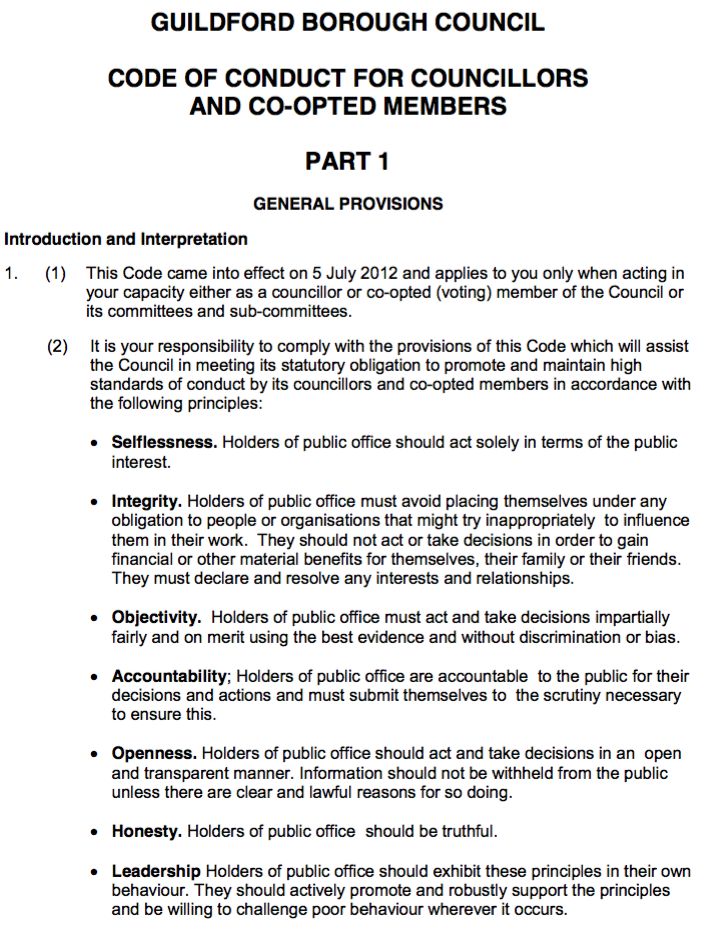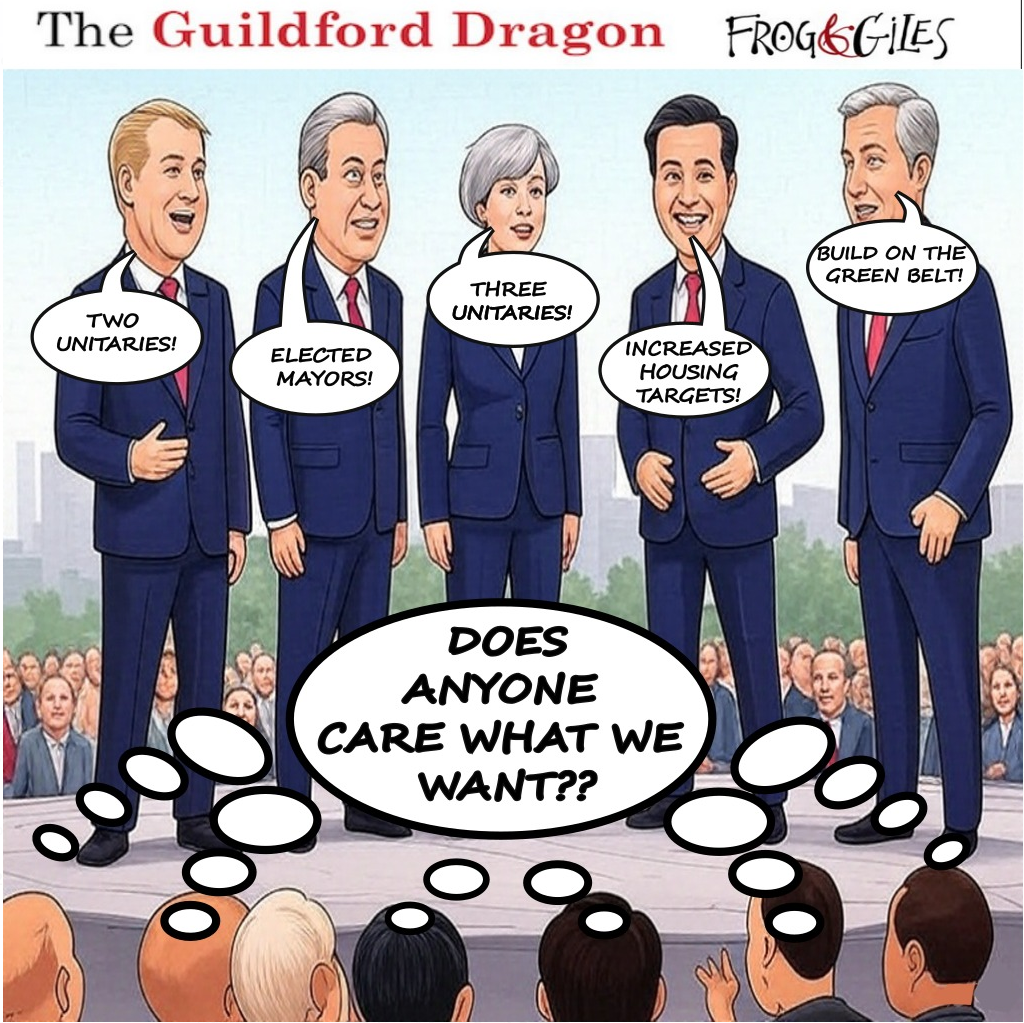 Abraham Lincoln
If given the truth, the people can be depended upon to meet any national crisis...
Abraham Lincoln
If given the truth, the people can be depended upon to meet any national crisis...
 Guildford news...
for Guildford people, brought to you by Guildford reporters - Guildford's own news service
Guildford news...
for Guildford people, brought to you by Guildford reporters - Guildford's own news service
Letter: Arbitrary Labels of Confidentiality Are A Travesty of the Nolan Principles
Published on: 12 Oct, 2017
Updated on: 12 Oct, 2017
In response to: Letter: Some Facts About the David Reeve Complaint
In propounding “facts”, Cllr Caroline Reeves perpetuates the confusion there appears to be between The Nolan Principles (or “The Seven Principles of Public Life” published by Central Government) and Guildford Borough Council’s Code of Conduct for Councillors and Co-opted Members.
Whilst the latter (GBC code) incorporates a subtly changed version of the former (Nolan principles) as its paragraph 2, its subsequent paragraphs provide further expansion, one of which almost directly contradicts the principle of openness, which is essentially the key issue at the heart of the accusations against Cllr David Reeve.
On openness, the seven principles state:
5. Openness
Holders of public office should act and take decisions in an open and transparent manner. Information should not be withheld from the public unless there are clear and lawful reasons for so doing.
…whilst the GBC Code in paragraph 2 states:
Openness. Holders of public office should be as open as possible about all the decisions and actions that they take. They should give reasons for their decisions and restrict information only when the wider public interest clearly demands.
(This is also the version used in the NHS statement of the Nolan Principles).
In this form, the GBC Code appears to entirely support the course of action taken by Cllr David Reeve which was the purported reason for the complaint against him: according to this part of the GBC code the information released by Cllr Reeve should not have been restricted in the first place, unless the wider public interest clearly demanded it.
To my knowledge no case, let alone a clear case, has been made by the complainants, or their supporterss, that there is a wider public interest for restriction of the released information in question (viz: an estimate of the historical number of jobs in Guildford in 2013).
If one were instead to refer to the Central Government form of the 7 Principles, then the reason for why the information in question might have been restricted needs to be both “clear and lawful”, Although it might be argued that there is a lawful reason (its purported confidentiality), to most rational observers, an arbitrary stamp of “confidentiality” on a report by a paid contractor is not in any way a clear reason.
Further on, the compilers of the GBC Code of Conduct felt that they were qualified to second-guess Nolan, and, under its paragraph 3, added their own pedagogy:
3. You must not:- (a) disclose information given to you in confidence by anyone, or information acquired by you which you believe, or ought reasonably to be aware, is of a confidential nature, except where:- (i) you have the consent of a person authorised to give it; (ii) you are required by law to do so; (iii) the disclosure is made to a third party for the purpose of obtaining professional advice provided that the third party agrees not to disclose the information to any other person; or (iv) the disclosure is:- (aa) reasonable and in the public interest; and (bb) made in good faith and in compliance with the reasonable requirements of the Council; or (b) prevent another person from gaining access to information to which that person is entitled by law.
This addendum has been relied upon by those wishing to restrict the release of information, who also ignore its exception 3(iv) (aa) (‘reasonable and in the public interest’).
However, such interpretation is in direct contradiction of the definition of ‘Openness’ in paragraph 2. It is clear that Cllr Caroline Reeves is referring to this interpretation of paragraph 3 in her letter, rather than to the Nolan Principles, in any of its forms, as she implied, both in her letter and again in chamber at Tueday night’s council meeting (at which the perverse and petty sanctions applied to Cllr David Reeve were ameliorated).
I suggest that this conflict of interpretation of openness be given a good deal of discussion when all of the councillors attend their plenary session to receive instruction on the Code of Conduct later in the month. They should pay attention to anything that Cllr David Reeve contributes, since he appears to have the strongest grasp of the true spirit of the Nolan principles within the council.
I also hope that Deputy Leader Furniss, if he follows through with his stated aim of proposing changes to the way that the council deals with “breaches of confidentiality”, also keeps the Nolan Principle of openness at the forefront of his mind, as well as the policies on public interest laid out by the Information Commissioner’s Office.
For a party commanding a majority in a council to use arbitrary labels of “confidentiality” to engineer a means of restricting the public release of information that it wants to keep secret would be a travesty of the Nolan principles.
Responses to Letter: Arbitrary Labels of Confidentiality Are A Travesty of the Nolan Principles
Leave a Comment Cancel reply
Please see our comments policy. All comments are moderated and may take time to appear. Full names, or at least initial and surname, must be given.Recent Articles
- Notice: The Brigitte Trust’s Before I Say Goodbye Workshops
- Opinion: CIL Payments – These Residents Deserve Justice
- Letter: Zero Carbon – Nothing But Hot Exhaust
- Following Slaughter of Cow, Police Warn Public Not to Buy Unpackaged Meat
- New Signage at Nature Reserve Unveiled
- Flashback: Mansbridge Survives Unprecedented Challenge To His Council Leadership
- Brutal Thieves Slaughter Animal for Its Meat Which Could Cause Sickness If Eaten
- Highways Bulletin May 19 – Protecting Wildlife During Roadworks
- Letter: It Would Be Good to Have Wind Turbines on the North and South Downs
- Letter: CIL Victims Deserve an Apology and Their Money Back


Recent Comments
- David Roberts on Flashback: Mansbridge Survives Unprecedented Challenge To His Council Leadership
- Tony Draycott on Letter: House of Fraser’s Closure Was the Last Straw
- Maria Dobson on Angry CIL ‘Debtors’ Thanked for Their Patience by Waverley Council
- R Wong on Angry CIL ‘Debtors’ Thanked for Their Patience by Waverley Council
- Paul Robinson on Ash Residents Come Together To Counter Catapult Attacks On Canal Wildlife
- J Crawford on Angry CIL ‘Debtors’ Thanked for Their Patience by Waverley Council
Search in Site
Media Gallery
Dragon Interview: Local Artist Leaves Her Mark At One of England’s Most Historic Buildings
January 21, 2023 / No Comment / Read MoreDragon Interview: Lib Dem Planning Chair: ‘Current Policy Doesn’t Work for Local People’
January 19, 2023 / No Comment / Read MoreA3 Tunnel in Guildford ‘Necessary’ for New Homes, Says Guildford’s MP
January 10, 2023 / No Comment / Read More‘Madness’ for London Road Scheme to Go Ahead Against ‘Huge Opposition’, Says SCC Leader
January 6, 2023 / No Comment / Read MoreCouncillor’s Son Starts Campaign for More Consultation on North Street Plan
December 30, 2022 / No Comment / Read MoreCounty Council Climbs Down Over London Road Works – Further ‘Engagement’ Period Announced
December 14, 2022 / No Comment / Read MoreDragon Interview: GBC Reaction to the Government’s Expected Decision to Relax Housing Targets
December 7, 2022 / No Comment / Read MoreHow Can Our Town Centre Businesses Recover? Watch the Shop Front Debate
May 18, 2020 / No Comment / Read More











Peter Shaw
October 12, 2017 at 11:09 pm
Well said.
Kes Heffer
October 13, 2017 at 11:10 am
In my letter above I referred to the version of the GBC Code of Conduct initiated in July 2012 (this was the version that appeared first in my online search) and missed the fact that it was updated in December 2014 to incorporate verbatim the central government’s “Seven Principles”.
Many thanks to The Guildford Dragon for their exemplary journalism in locating and publishing the updated version as an inset above. The update makes minimal, if any, difference to the substance of my argument.
David Roberts
October 15, 2017 at 6:01 pm
It is shocking that, since the Audit Commission was abolished in 2015, there have been no national standards of conduct for councillors apart from the Nolan Principles, which apply to all public servants and are not legally enforceable. This means each council is free to draw up its own code and procedures, diluting and distorting generally accepted norms as Kes Heffer describes.
The result in Guildford has been the same as in other one-party rotten boroughs like Tower Hamlets: criminality and cover-up (the Juneja case), arrogance and lack of transparency (the Dongying visit), tribal party behaviour (every council meeting), intolerance of dissent and outright bullying (the David Reeves case).
This is only to be expected where local leaders are left to mark their own homework. Without a bigger opposition, very little protects ordinary residents from cronyism and corruption on the council.